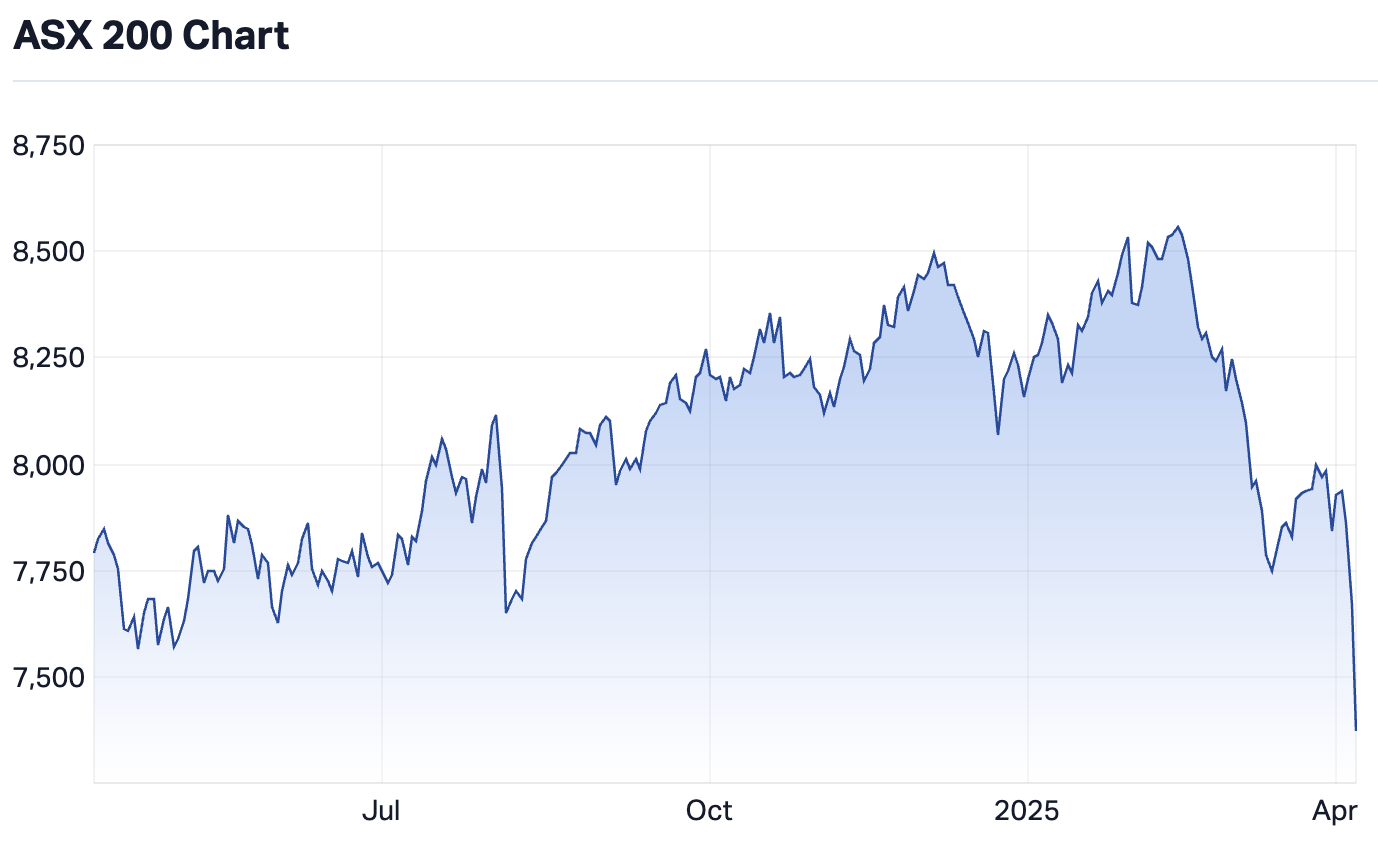"Selling out is the worst thing you can do" - Ben Clark on how to handle today's market carnage
It’s been another bleak day for markets as US president Donald Trump’s tariff-led trade war continues to send shockwaves around the world.
After US markets sold off dramatically on Friday, the ASX followed suit today with the benchmark S&P/ASX 200 dropping more than 6% in the first 10 minutes of trade.
It leaves the leading ASX index down more than 11% in 2025 and back at levels last seen in December 2023. The All Ordinaries index was also down more than 6% in morning trading.

But the pain didn’t end there.
Many other markets are seeing red, including those that had held up well in the face of recent volatility.
With JPMorgan now predicting a 60% chance of a global recession in 2025, things could also be about to get worse.
Here’s a summary of what has unfolded in case you’ve missed it (or have been too afraid to look), and what you should be doing now.
Australian stock market
All 11 ASX sectors were down Monday, with Energy (-8.06%) and Materials (-5.80%) the worst hit.
With iron ore and other commodities also down, the big mining stocks couldn't avoid the carnage. BHP Group (ASX: BHP) dropped 6.4%, while Fortescue Ltd (ASX: FMG) was down more than 7%.
The Aussie banks didn't fare any better.
Commonwealth Bank (ASX: CBA) was down more than 6%, with ANZ (ASX: ANZ), NAB (ASX: NAB) and Westpac (ASX: WBC) all down around 5%.
Investor favourite, Pro Medicus Ltd (ASX: PME) tanked 8.51%, while Titomic Ltd (ASX: TTT) was the hardest hit of all mid-caps and above, down more than 18%.
There were some winners, though.
Abacus Storage King (ASX: ASK) was up more than 14% off the back of a takeover proposal from Ki and Public Storage.
It was a similar story for Challenger Ltd (ASX: CGF), which was up more than 8% after life insurance company TAL took a 15.1% stake in the investment management company.
US Stock Market
The S&P 500 was down almost 6% on Friday, recording its worst two-day session since March 2020. It is now 17% down from recent all-time highs and likely to fall further when US markets open tonight.
The Nasdaq is now also officially in a bear market, having dropped 22% since its peak in February.
Global Stock Markets
Japan’s Nikkei 225 index was down almost 9%, with the South Korean KOSPI index dropping 5%. Hong Kong’s Hang Seng also opened more than 9% down.
The UK’s FTSE 100, which had surged in recent months, also dropped almost 5% on Friday, wiping out its gains for 2025.
Australian Dollar
To compound the misery, the Australian dollar has also taken a pummeling.
It dropped to 0.59 USD, the lowest since the Covid crash of March 2020, and also plummeted to 0.55 EUR, another 5-year low.
The dollar has also crashed to 0.47 GBP, the lowest level in a decade (and pre-Brexit).
Commodities
Brent crude dropped 3.32% today, with copper down almost 5.5% and iron ore down 4%.
Even gold, which has recently reestablished its worth as the safe haven asset, was down 1.39%. Silver was also down more than 2%.
VIX
The VIX Volatility Index, which measures expected volatility in the S&P 500 over the next 30 days, was up 50% to more than 45, its highest level since March 2020.
Bitcoin
Having shown resilience over the weekend, Bitcoin finally capitulated overnight, dropping more than 6% to US$77,200.
What should you do next?
According to Ben Clark, portfolio manager at TMS Private Wealth, now is not the time to make any rash decisions in the face of today's crash.
"It's too late to react to it. Selling out would be the worst possible thing that you could do at the moment," says Clark.
While he believes it's impossible to predict Trump's next move and how it will impact markets, he did see a potential correction on the cards.
"The markets at the start of this year were very expensive, both in Australia and in the US," Clark says.
"There was a lot of euphoria about Trump at the time and even before Trump got into office, markets had had an extremely strong run. If we looked at the Australian market, there had been a disconnection between what the share market was doing and what the profits that are listed on the market were doing."
"We saw quite significant multiple expansion that accelerated when Trump won the election. The US market caught a big bid and our market followed it higher. And, of course, what we've seen since then is Trump has wrong-footed everyone and markets have reacted."

The next steps
Looking at how you're positioned and planning for the recovery are the most productive things you can be doing right now, according to Clark.
"The only thing to do now is think about the businesses that are going to be the most sought after when the bounce does happen, and make sure that you're positioned in those businesses."
"Valuations have suddenly got a lot more attractive than they were just three months ago and whatever comes out of America, comes out of America," says Clark.
"None of us can predict that, but I know that high-quality businesses are now much more attractively priced than they were, which means that the outlook for their returns has got significantly better than it was in January."
5 topics
10 stocks mentioned
1 contributor mentioned

